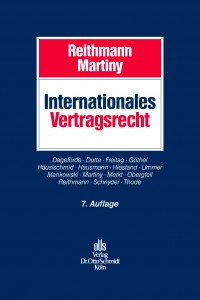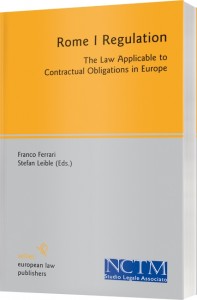Publication – Electronic Consumer Contracts in the Conflict of Laws
Hart Publishing has kicked off its new Studies in Private International Law series with Zheng Sophia Tang’s excellent Electronic Consumer Contracts in the Conflict of Laws (2009). It is based upon Sophia’s PhD thesis, completed at the University of Birmingham in 2007. The blurb:
The application of private international law to electronic consumer contracts raises new, complex, and controversial questions. It is new because consumer protection was not a private international law concern until very recently and e-commerce only became an important commercial activity within the last ten years. E-consumer contracts generate original questions which have not been considered under traditional private international law theories. It is complex because it has to deal both with difficulties raised by consumer contracts and the challenges of e-commerce. Reasonable resolutions to consumer contracts may prove inappropriate in e-commerce, while effective approaches to resolving private international law problems in e-commerce may be improper for consumer contracts. It is controversial because it concerns the conflicting interests of consumers and businesses in a fast-moving commercial environment – a fair balance is therefore hard to achieve.
Without proper solutions provided by private international law, consumers will not be confident about purchasing online, and businesses will face unreasonable risk and participation costs in e-commerce. Updated and properly designed private international law rules are essential to the further development of e-commerce. This book aims to provide an answer to the urgent requirement for legal certainty, security and justice in e-consumer contracts. It is primarily concerned with existing approaches to jurisdiction and choice of law issues in e-consumer contracts in the European Community and England, but some typical approaches in other jurisdictions are also examined. Based on the analysis and the comparative study of the existing law, the book seeks to provide a proposal as to what the law should be in order to provide certainty to both parties, to provide reasonable protection to consumers, and to promote the development of e-commerce.
You can purchase it from Hart Publishing for £50.00, or from Amazon for £47.50.
 Happy New Year to everybody. I have not posted in a while, but am now freed from the shackles of teaching (well, mostly) for this year, and so can devote myself to conflictoflaws.net once again (not, I’m sure, that anyone noticed my absence, given the dedication of my co-editors).
Happy New Year to everybody. I have not posted in a while, but am now freed from the shackles of teaching (well, mostly) for this year, and so can devote myself to conflictoflaws.net once again (not, I’m sure, that anyone noticed my absence, given the dedication of my co-editors). The
The 

